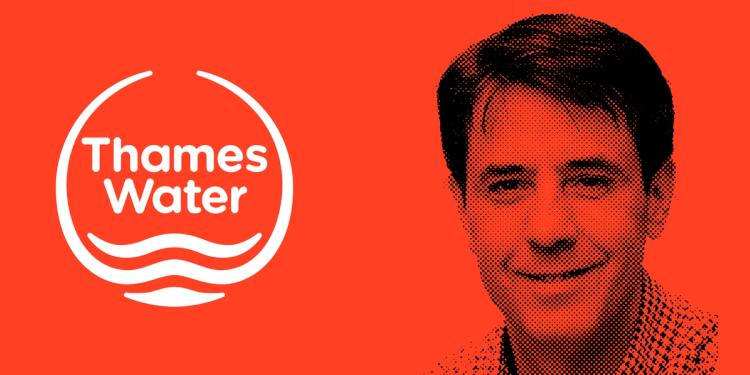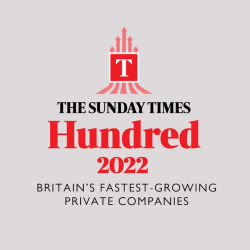Deliberately different, by design: the Tecknuovo growth story
In 2015, our Co-Founders Gus and Kieran planted the seed that saw Tecknuovo grow into one of the UK's top challenger technology consultancies today. This is the story.
Read more
Transformation guru Mike Potter has made a name for himself as a consummate change agent in complex organisations. Here, he charts the development of his career and ethos – and why he chose Tecknuovo as delivery partner on his latest project, Thames Water.
Mike first became interested in transformation 23 years ago, as business improvement manager at flagship UK chemicals firm ICI. “As part of that role,” he says, “I was asked to go and work at a plant to show that I understood the business. Although the plant was fairly new, it was flagging, so my boss wanted me to work out how we could turn it around. And the way I did that was by asking the people who actually worked there what they thought we could do differently. When they came up with loads of great ideas, I said: ‘Here’s some money and freedom – go and see how you can use them to make a difference.’ No one had ever spoken to them like that before.”
In just 18 months, Mike and his team revitalised the plant from the worst-ranked facility in the business to the best-ranked globally in its sector: an extraordinary achievement. “It was liberating for the team,” he says, “and incredibly motivating for me.”
Transformation bug duly caught, Mike immediately felt his experience coalesce into a worldview. “All too often,” he notes, “the people who are closest to either the customer or core operations are never listened to, or engaged in shaping different approaches. The project led me to want to do that type of work on a grander scale, across a wide range of organisational contexts – taking with me the belief that my primary role was to help others be successful by creating environments in which they could maximise their contribution.”
He says: “From there, I made the connection that if you keep going back into a business enough to turn parts of it around, you eventually change behaviours. And if you keep doing that enough, you change the wider culture. In short, it’s about people. Not pipes.”
From then on, Mike’s career became a transformational tour of private- and public-sector engagements, taking in change-making stints at Boots, the Environment Agency, NHS Blood and Transplant, HM Revenue & Customs and the Cabinet Office. His work for government bodies in particular drew upon values instilled in him during his formative years.
“Aside from being naturally quite mission focused,” he explains, “the reason I got into government was because both of my parents are from the military. My father now works in the NHS, as does my brother. So, I was brought up with quite a strong public-service ethos. But more than that, I took the view that government has historically underserved those who need it most, and overserved those who need it least. Doing transformation work in public life gives you the opportunity to help those who are underserved – whether they’re people who need organ transplants, or those who need a tax system that will enable them to lead less stressful lives.”
He notes: “That whole concept of making a difference to the underserved connects in my mind with the desire to leave behind something that will endure. The culture, capability and credibility of the teams you’ve built must keep driving the things you were doing long after you’ve moved on.”
That outlook prepared Mike for his next challenge: Thames Water – an organisation at the forefront of a crunch point in our use of natural resources. “Fundamentally,” Mike says, “the next 30 years will be pivotal for water consumption. As well as driving scarcity of supply, climate change is going to excite demand – to the point where, if we carry on as we are, there just won’t be enough water to go round. It was essential for Thames Water to be in better shape to navigate that looming complexity.”
While business improvement was occurring in annual increments at Thames Water, it fell significantly short of the dramatic step change that was required to safeguard the organisation’s life-critical service for the long term. As a result, the firm’s ability to influence external parties on topics such as best-practice water use, or efficiency in water-dependent products, was affected.
“You can only do that type of influencing if you’re coming from the position of being a credible company within the sector,” Mike points out. “When I joined Thames Water in 2019, it was saddled not only with low confidence among stakeholders and policymakers in its ability to do its job, but a low capability to improve and transform its business. It was vital to recognise the need to do far more, while ensuring that customer bills wouldn’t rise as a consequence.”
In Mike’s mind it was imperative to engender not just a need, but a desire to be incredibly ambitious, in a way that would far surpass that sort of incremental approach. Due to this, Mike steered the firm away from cosmetic digitalisation in favour of something much more radical. “The challenge was to initiate a fundamental shift towards using huge volumes of datasets – along with technologies such as machine learning and AI – to make better decisions about how we operate, maintain and invest in our network. Addressing those points in that way was going to take Thames to where it needed to be.”
The phrase “where it needed to be” lies at the heart of Mike’s guiding approach throughout the project: ‘future-back’ thinking. Essentially, he says, it’s a process of implementing “what needs to be true” in order to realise a transformation’s desired, optimal end-state. “Today,” he explains, “people in London and the South East consume an average 147 litres of water per day. To be future fit, Thames had to support an average, daily consumption per person of just 90 litres – comparable to present-day South Africa.”
So, what had to be in place to enable that? “Well,” he says, “we had to fix leakage. We had to encourage customers to change their behaviour. And we had to be more efficient. So, we thought back to what needed to be true to make those things happen. Take fixing leakage, for example: we had never done that at scale before. If you try to carry out a series of high-yield replacements en-masse, the unit costs are simply too high. That meant we had to look at options such as dig-less technology so we could repair pipes without making huge holes in the ground. That, in turn, drove our innovation and investment agenda.”
In tandem with that guiding approach, Mike notes, the effort revolved around three, core tenets:
Tecknuovo served as Mike’s delivery partner on the project. What made him choose them? He explains: “Many change leaders tend to default to working with big delivery partners on the grounds that they’ll always have scale. But that isn’t really true. Those companies often face their own scale challenges – and are not always able to move quickly. Tecknuovo had two assets: a proven track record of rapid scaling, and the agility to respond quickly and predictably to our needs.”
Mike notes: “They were also, crucially, a strong culture fit. All the tenets and workstyles I’ve outlined were things I wanted to hardwire into the business – but I couldn’t do it all on my own, or even with just the internal team. I needed a partner who could operate in exactly the same way as me. ‘Partner’ is a rather overused word in this field, but for me it means sharing values and behaviours as well as success. And that’s how our partnership with Tecknuovo worked.”
Mike also welcomed Tecknuovo’s imaginative and honest approach to providing advice. “Sometimes we’d come up with real headscratchers,” he says. “Scenarios where we didn’t actually know what to do. On those occasions, Tecknuovo helped us to work the problem and come to an appropriate solution. They were also very good at holding a mirror up to us and saying, ‘We don’t think that’s quite the right path to take – how about trying this way instead?’ Even if it cost them revenue. And that’s extremely rare.”
Thames Water is no longer a digital business once a year, during our key billing event, and is now a digital business every day of the year. Over the last 18 months they have increased digital take up from 25% to over 60% of customer contacts being exclusively digital, with plans to increase this over 80% over the next year. This has increased satisfaction, reduced complaints, reduced cost to serve customers and, most importantly, ensures that their agents are available to support customers who need them most. It is clear evidence of how his personal ethos of fundamental and dramatic transformation can raise standards and ambitions to heights that once seemed fancifully out of reach.
“As a transformation specialist,” he says, “you move from setting out as a sort of scrappy insurgency to becoming a scale insurgency and, finally, a scale incumbent. And that’s essentially where the Thames project is at now.”
He notes: “Scaling fast – what has become known as ‘blitz-scaling’ – is key. In any business, there are an awful lot of naysayers. They’ve got a playbook of how to stop things happening, and they’ve tried it all before. The way you get past all that negativity is just by proving you can do it. And telling powerful stories about that success not only wins people over, but marginalises those negative voices.
“After all,” he adds, “who wants to get out of bed for mediocrity? Not me.”

In 2015, our Co-Founders Gus and Kieran planted the seed that saw Tecknuovo grow into one of the UK's top challenger technology consultancies today. This is the story.
Read more

Tecknuovo is ranked 78th on the Sunday Times 2022 100 Fastest-Growing Companies list. This list recognises the fastest-growing private companies in the United Kingdom. Listed companies must demonstrate consistent growth, create jobs, and, sustain profitability.
Read moreGet the inside scoop — delivered straight to your inbox.